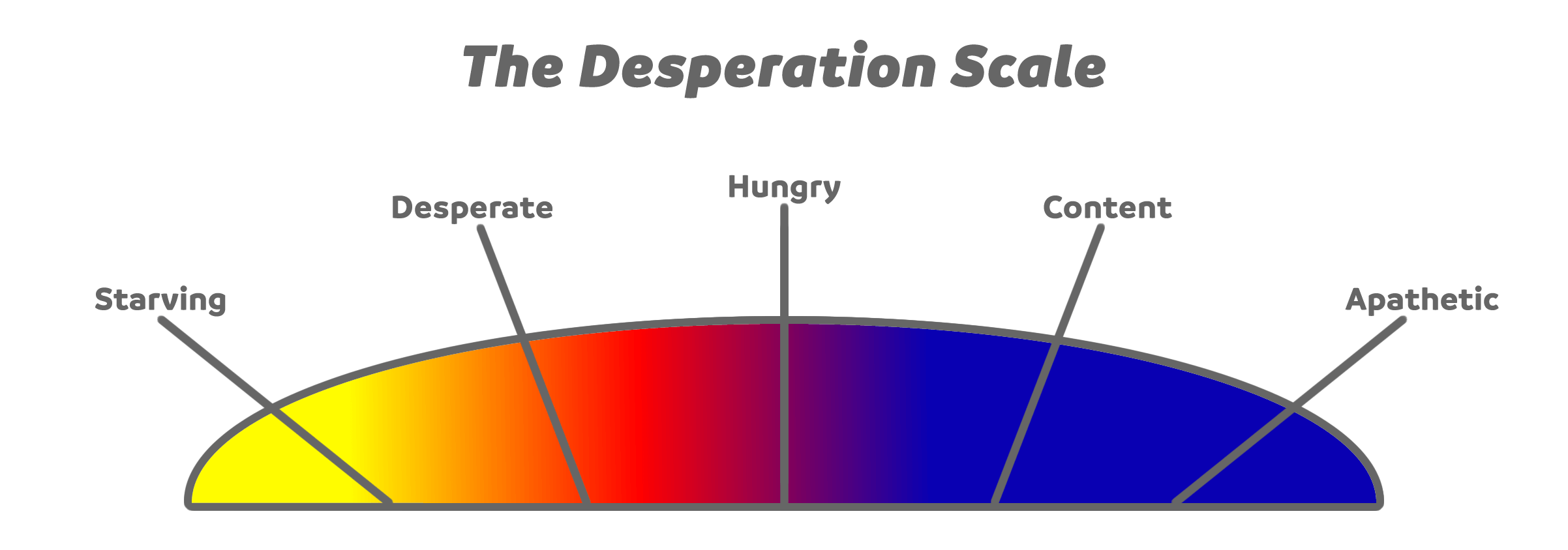How desperation affects creativity
Creativity's biggest enemy is desperation. (Source)
In my early 20s, I started two retail stores with a friend. Retail is hard; even the big guys go bankrupt. After 3 years, we were losing too much money. We decided to close down.
I was personally responsible for a portion of the company's losses.
That amounted to about $80,000.
I was young and didn't have that much money. This debt was a huge burden. I went from being a creative, energetic person, to someone who was anxious and desperate. I couldn't think straight.
Sometimes being desperate can be the push we need. When your back's up against the wall, you're able to muster every bit of energy you have and push hard.
But desperation can also have the opposite effect.
It can make you feel tired, hopeless, and disoriented. Desperation can, metaphorically, squeeze the creative juice right out of you.
In 2013, Harvard researchers did a study on how financial stress affects decision-making. Denise Cummins, Ph.D. explains their findings in Psychology Today:
When the cost of [a car] repair was increased to $3,000, a very different picture emerged: The cognitive performance of those at the upper end of the income distribution was unaffected by the increase. But those at the lower end suffered a 40% decline! The authors interpreted this to mean that scarcity impaired people’s ability to think clearly. The threat—even an imagined threat—of a large bill made it difficult for poor people to focus on the cognitive tasks at hand.
Desperation impedes your thinking. You become consumed by the moment and your immediate needs. You can't see the big picture.
"Stress is a well-known creativity killer" - psychologist Robert Epstein, PhD (Source)
Isn't it ironic? So many artists, makers, and independent entrepreneurs are under stress all the time! That stress removes the one thing we need to survive: our creativity.
The Desperation Scale
I believe that makers often create their best work when they're hungry.
When you're hungry (but not desperate), you're motivated to build your product, expand your network, grow your audience, and improve your marketing.
You want to avoid desperation and starvation, but you also don't want to become apathetic; you want to stay hungry.
What causes us to slip into desperation? Here are a few examples:
- You quit your job, hoping to launch your big product. But the sales for your product haven't been as good as you'd hoped.
- You just got billed for a huge medical bill, and you don't have insurance.
- You're a founder building your second company, and you're terrified of failure.
At some point in our lives, we'll all experience some desperation. We need to be prepared for it, and learn how to respond the right way.
Stay calm
Your first impulse will be to become manic. Your lizard brain will take over and will be hell-bent on survival. Desperate times lead to desperate thinking.
Stay calm. Don't jump to the first thing that crosses your mind.
Here's the framework that I used when I had that $80,000 debt hanging over me:
- Support: find a group of people you can be real with. This could be an online community, a friend you meet weekly for coffee, or a mastermind group. The point is: you can't do this alone. You need people that can look at your life, and give you an outsider's perspective. Desperation clouds our vision; get people who can help you see clearly.
- Habits: usually when we're stressed out, we resort to bad habits. This could mean more TV, more alcohol, less sleep, etc... Desperate times call for better habits, not worse. Make sure you take care of yourself. Getting a good amount of sleep, healthy food, and exercise are all things you can control.
- Focus on the bottom line: the biggest cause of our stress is often financial. If you're struggling with money, your first step is to find out: what's the difference between what you need and what you currently have? If you need $5,000, but only have $4,000, focus on getting that last $1,000 in the most efficient way possible. That could mean building a product, but it might be more efficient to ask for a raise or double your freelancing rates.
How to avoid desperation
Want to build your own product? It's especially important for you to stay vigilant. Here's my advice for makers who want to go independent:
- Get therapy. I resisted getting a therapist for ages. Finally, I went to therapy, and it was a game-changer. Your mental health is important. It's worth investing in – especially if you're feeling depressed.
- Don't quit your day job too soon. I worked on side projects for years (building a reputation and an audience) before I quit consulting full-time. When folks can't create the results they want, it's easy to slip into desperation mode. After all, they're not getting a regular paycheque anymore! Build things up on the side before you quit.
- Have a financial cushion. I had 3 months of living expenses saved up when I quit consulting. That's the bare minimum. 6-12 months of savings are even better.
- Get in the habit of planting seeds, and harvesting crops. be like a farmer! An independent maker is constantly planting new ideas, with the hopes that they'll be able to harvest those efforts months down the road.
Long-term, product revenue will definitely bring you more freedom. But remember, it's incremental freedom. You'll start now and earn your first $1 today. Tomorrow it will be $2, and so on.
"Building your own stuff provides an incremental freedom."
One last thought: help others
Are you in a strong position right now? Help others! People need someone strong to believe in them, encourage them, or invest in them. If you're in a place where you can give, do it!
Cheers,
Justin Jackson
@mijustin
